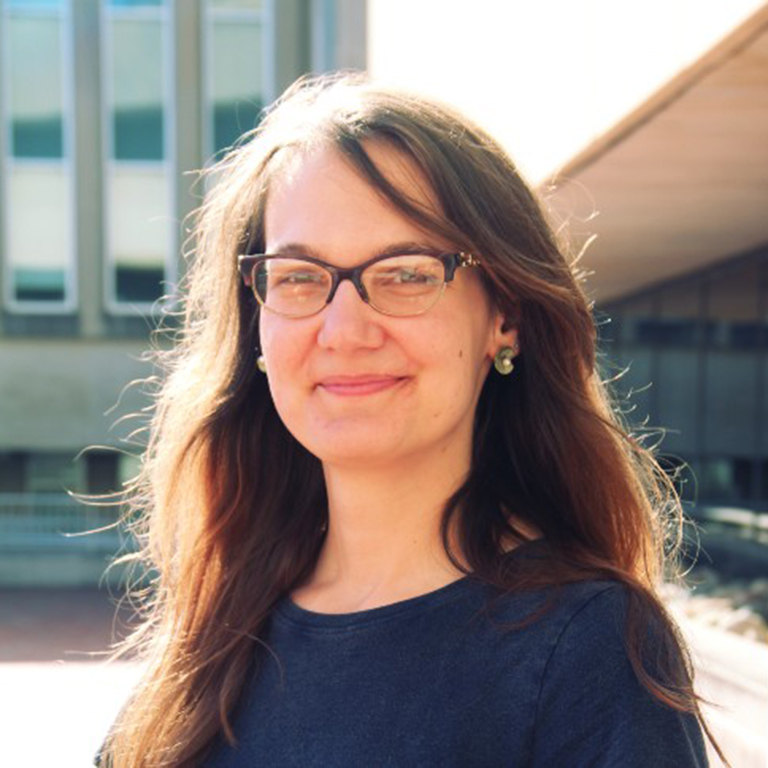This Q&A series highlights McKinney Climate Fellows alumni and their professional journeys within Indiana and beyond. The McKinney Climate Fellows program, administered by Indiana University’s Environmental Resilience Institute and Integrated Program in the Environment, connects IU undergraduate and graduate students interested in climate, sustainability, and community resilience with career experiences.
As a McKinney Climate Fellow in 2021, Kerry Korpela helped institute a sustainability framework for Fort Wayne City Utilities projects, collaborating remotely with the City Utilities’ Office of Energy Engineering and Sustainability.
After completing her master’s degree from the IU O’Neill School of Public and Environmental Affairs later that year, Korpela joined Fort Wayne City Utilities as a program manager. The position gives her a front-row seat to the sustainable energy transition taking place in the city and throughout the state, a subject Korpela studied closely during grad school.
In April 2023, Fort Wayne announced its climate action and adaptation plan, which outlines the city’s priority areas to address climate change. Korpela is playing a leading role in implementing the plan. The following interview has been lightly edited for length and clarity.
What major project did you work on during your McKinney Climate Fellows placement?
I worked a little bit on the climate adaptation and action plan doing research on the sustainability management policy. The major initiative I worked on was Envision, which is a program similar to LEED, but for infrastructure projects. The program helps evaluate infrastructure and building projects for their carbon footprint and works to create a comprehensive sustainability plan for those initiatives. I worked directly with the City Utilities office, where I am now.
What called you to pursue a career focused on climate and sustainability and why did you decide to work in Indiana?
I have always been interested in environmental work. Being from Michigan, the IU O’Neill School of Public and Environmental Affairs drew me to Indiana. I didn’t necessarily expect to stay in Indiana after graduate school, but learning about the work of Hoosier communities with ERI and through the fellowship led me to stay here. My capstone course in graduate school was focused on the Indiana electrical grid and learning the intricacies of the electricity sector showed me how fundamental electricity is to sustainability. Indiana is a place that is experiencing the energy transition and I wanted to stick around to see how the work played out.
What is your current position and what responsibilities does your job include?
I currently serve as a program manager in Energy Engineering & Sustainability Services within Fort Wayne City Utilities. My current role is more broad than what I did during my fellowship and every day my work is new and different. Sustainability is still a major part of it as I seek to incorporate more energy conservation for government properties and tracking energy usage. Another part of my role is lending my policy skills to many areas within City Utilities as we navigate new federal and state resources.
What do you like about your current job?
I really enjoy working with a variety of people to help expand on their efforts to increase sustainability efforts under our climate action and adaptation plan. Being a source of knowledge for climate change, sustainability, and energy conservation efforts has become one of my favorite parts of this role, too.
What advice would you give to current students who are interested in the McKinney Climate Fellows program?
Keep your scope broad and don’t be afraid to be open to incorporating other disciplines or techniques into your work. It’s not just about climate and science work, it includes so many other things. Staying open to other approaches and opportunities can set you up for success.
Looking forward, what do you think young professionals interested in climate careers should know as they enter the workforce?
Stay grounded. Take environmentalism, sustainability, and this work in context with other trends and events going on in the world. Getting absorbed in this work can make it difficult to stay grounded, but putting your work into context can make your role make more sense. Being flexible and open to more career options and learning opportunities is the best advice I can give. The network being created by the McKinney Climate Fellows Program and ERI has been a great resource and I would encourage people to take advantage of it.



